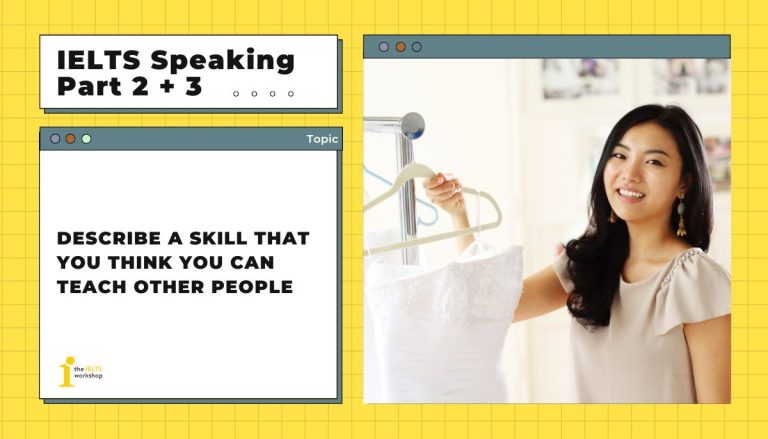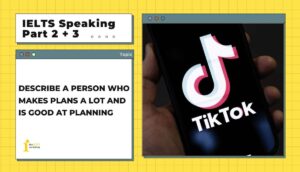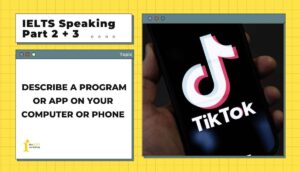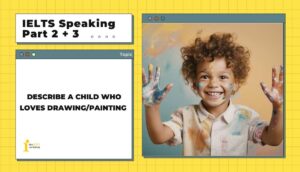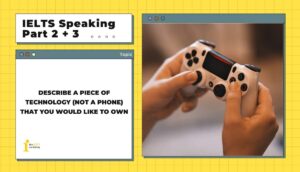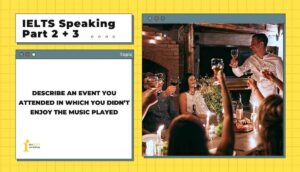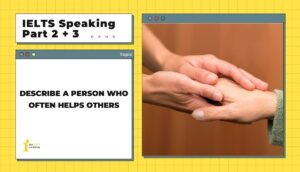Trong chuyên mục giải đề IELTS Speaking kỳ này, cùng tham khảo bài mẫu của thầy Bùi Hoàng Anh từ The IELTS Workshop với chủ đề: “Describe a skill that you think you can teach other people”. Cùng tham khảo tự vựng và các cấu trúc ghi điểm nhé.
Part 2: Describe a skill that you think you can teach other people
Describe a skill that you think you can teach other people
You should say:
What it is
When you learned it
How you can teach others
And how you feel about this skill
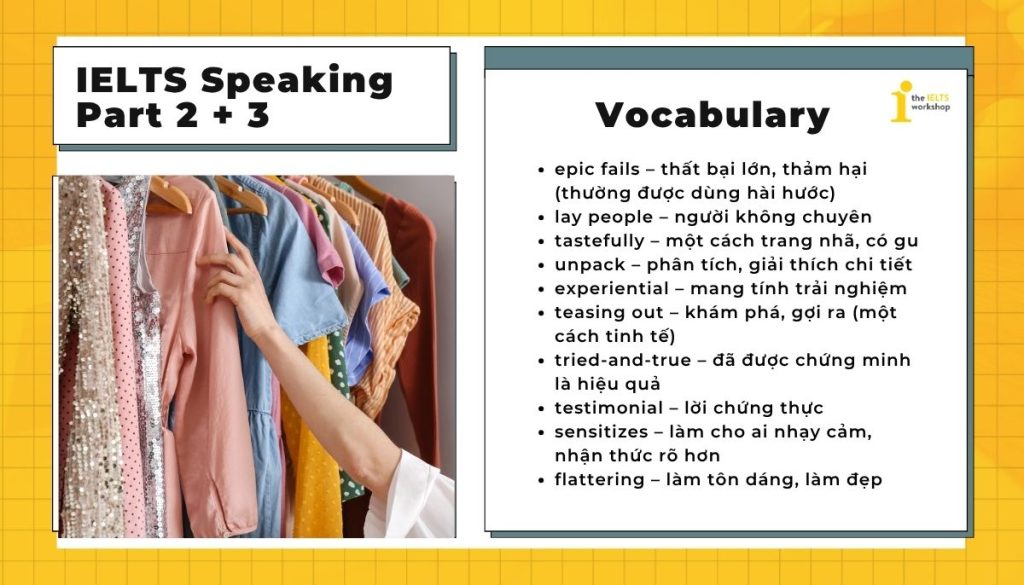
Dưới đây là bài mẫu cho topic “Describe a skill that you think you can teach other people”.
1. Bài mẫu (Sample)
Over the years, through my epic fails and enlightening consultations with professionally trained friends about clothes, I believe I have gained enough insights to be an informal coach for lay people on how to dress tastefully.
I plan to unpack the practices behind this skill through experiential, hands-on teaching and learning: dressing people in different outfits, then, by having them comment on photos of themselves, teasing out the visual effects of particular stylistic choices. This is a tried-and-true approach, leading my big brother James, according to his testimonial, to discover his fashion mistake: wearing too juvenile shirts and pants while on the job as a salesman. After doing an entire makeover to suit and ties, he said customers spoke far more favorably of his look: they found him professional, and his words legitimate. The result was he closed 5–6 times as many deals.
I believe the ability to dress in a presentable way is always invaluable. It sensitizes people to problematic attire, such as skimpy tops with plunging necklines in formal events, which are overly sexual, making other attendees uncomfortable at best, and repulsing them at worst, especially in the event of a wardrobe malfunction. Also, such fashion education would nurture the wisdom needed for one to fully bring out clothing items’ flattering features, while removing unflattering ones. A case in point is my savvy colleague Jane, who wears all black, accessorizing it with gold: the color is clean and slimming, but not funereal given the bright shines of the jewelries.
Sample by Bui Hoang Anh, IELTS Teacher at The IELTS Workshop
2. Từ vựng (Vocabulary)
- epic fails – thất bại lớn, thảm hại (thường được dùng hài hước)
- tried-and-true – đã thử và thấy đúng
- lay people – người không chuyên
- tastefully – một cách trang nhã, có gu
- unpack – phân tích, giải thích chi tiết
- experiential – mang tính trải nghiệm
- teasing out – khám phá, gợi ra (một cách tinh tế)
- tried-and-true – đã được chứng minh là hiệu quả
- testimonial – lời chứng thực
- sensitizes – làm cho ai nhạy cảm, nhận thức rõ hơn
- flattering – làm tôn dáng, làm đẹp
Xem thêm: Tổng hợp bộ từ vựng tiếng Anh về chủ đề Quần áo (Clothes)
Part 3
- Which age group is the best at learning new things?
- Which do you think is more important, practical skills or academic skills?
- What qualities should teachers have?
1. Which age group is the best at learning new things?
It is often assumed that younger people, especially those before the age of puberty, are most capable of learning, since they are much quicker on the uptake, evidenced by the commonly used simile of their brains being like sponges, soaking up knowledge. Explanation varies from their brain neuroplasticity, or the readiness to commit new concepts to memory, being the strongest at the time, to lower self-consciousness about making mistakes. Still, this is just a hypothesis, as the evidence is not clear-cut. In my view, there isn’t a best period, as adults, in the right instructional environment for their age: analytical, evaluative and autonomy-rich, can outperform young learners.
- uptake – khả năng tiếp thu, hiểu nhanh
- soaking up (knowledge) – hấp thụ (kiến thức), thường dùng trong ngữ cảnh học tập tự nhiên
- neuroplasticity – tính dẻo của não bộ, khả năng thay đổi và thích nghi của não
- commit (to memory) – ghi nhớ, đưa vào trí nhớ dài hạn
- self-consciousness – sự ngại ngùng, tự ý thức (về bản thân)
- hypothesis – giả thuyết
- clear-cut – rõ ràng, dứt khoát
- instructional environment – môi trường giảng dạy, học tập
- analytical – có tính phân tích
- evaluative – có tính đánh giá
2. Which do you think is more important, practical skills or academic skills?
I do not think one set of skills matters more than the other. One may intuitively say that the skills for applied settings are superior, the reason being there are more applications in life. However, the distinction becomes invalid with strategies defined as both types, say proper citations and referencing. Furthermore, both skills at times deserve the same level of attention. For instance, when conducting empirical research, one should spend as much time on perfecting data collection practices, a real-world skill, as on data analysis, a study skill, as they inform each other, and equally contribute to the success of the studies.
- intuitively – một cách trực giác (theo cảm nhận, không cần lý luận)
- applied settings – bối cảnh ứng dụng thực tiễn
- distinction – sự phân biệt, sự khác nhau rõ ràng
- invalid – không còn giá trị, không hợp lệ
- citations – trích dẫn
- referencing – việc ghi nguồn tài liệu tham khảo
- empirical (research) – nghiên cứu thực nghiệm (dựa trên số liệu, quan sát thực tế)
- inform (each other) – ảnh hưởng và hỗ trợ lẫn nhau (trong ngữ cảnh học thuật)
- contribute (to) – đóng góp vào
- study skill – kỹ năng học thuật
3. What qualities should teachers have?
Apart from the qualities long extolled like empathy and patience, I am convinced that teachers should be critical thinkers, so they can discern the true impact of their teaching; that is, to know that a class full of laughter is not always indicative of students’ learning. Clearly, the teachers would then adjust their methods alongside measuring the success until it is achieved. Another key attribute of instructors is the love of learning. They may need to be lifelong learners, continuously updating to have current expertise, to be relevant as society develops rapidly.
- extolled – được ca ngợi, tán dương
- laughter – tiếng cười
- empathy – sự thấu cảm
- patience – sự kiên nhẫn
- critical thinkers – những người biết tư duy phản biện
- discern – nhận ra, phân biệt
- indicative (of) – cho thấy, biểu thị
- adjust – điều chỉnh
- measuring (success) – đo lường (sự thành công)
- attribute – phẩm chất, đặc điểm
- lifelong learners – người học suốt đờ
Sample by Bui Hoang Anh, IELTS Teacher at The IELTS Workshop
Xem thêm: Describe a time when you taught a friend | Bài mẫu IELTS Speaking Part 2
Tạm kết
Trên đây là bài mẫu cho chủ đề Describe a skill that you think you can teach other people trong IELTS Speaking Part 2 và 3. Đừng quên luyện thêm các chủ đề khác để mở rộng ý tưởng và củng cố từ vựng học thuật. Nếu bạn muốn xem thêm các chủ đề tương tự, hãy tham khảo KHO BÀI MẪU IELTS SPEAKING và Bộ đề dự đoán IELTS Speaking Quý 2 (T6 – 08/2025) – Full 3 Parts của The IELTS Workshop nhé !
Tham gia ngay lớp HỌC IELTS MIỄN PHÍ cùng đội ngũ giáo viên tại The IELTS Workshop để nắm vững kỹ năng làm bài thi một cách hiệu quả nhất!


